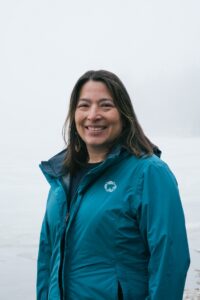‘Conversations about Cancer’ new video series aimed at engaging Indigenous communities

GREATER SUDBURY – Health Sciences North (HSN) and the Northeast Regional Cancer Program are launching a new and engaging animated video series about cancer featuring First Nations family physician Dr. Erin Peltier.
The “Conversations about Cancer” video series is intended for Indigenous people of all ages who want to learn more about what cancer is and why it is so important to get screened.
The videos are available in Cree, Ojibwe, English, and French on the HSN website: www.hsnsudbury.ca/IndigenousCancer
“Shortly after starting my role as the Regional Indigenous Cancer Lead in 2019, I set out to connect with as many communities and health care providers for Indigenous Peoples in the Northeast catchment area that I could,” says Dr. Peltier. “Community members suggested having videos that could help provide cancer screening information from a trusted healthcare professional.”
Dr. Peltier and the cancer screening team from the Northeast Regional Cancer Program, in collaboration with HSN Indigenous Health and other partners, went on to develop this unique video series for Indigenous audiences. The series includes five videos that address what cancer is as well as the importance of screening for breast, colorectal, cervical, and lung cancer.
“There are unique barriers and inequities in the North that prevent some Indigenous people from getting the care and information they need,” says Deanna Jones-Keeshig, Director for Indigenous Health. “HSN and cancer care staff worked closely with communities to ensure these videos helped close those gaps and that the messages were clear.”
The Northeast Regional Cancer Program screening team works with health care providers, screening sites and directly with First Nations across the entire northeast region.
Administrative Director Stephanie Winn is encouraged by the level of detail the team was able to incorporate into the videos from community feedback.
“Active cancer screening unquestionably supports early detection and diagnosis of many types of cancers. These videos will answer questions, alleviate concerns and encourage Indigenous community members to actively seek out cancer screening.”
So far, feedback on the videos from communities has been very positive. Line Baillargeon, Health Administrator with Wahnapitae First Nation at the Norman Recollet Health Centre, thinks the videos will be a powerful education piece.
“As a breast cancer survivor, I know personally how important early detection is. Some people are very hesitant to get checked. For example, we lost my Dad to Stage 4 colon cancer and he hated going to doctors and avoided screening. Dr. Peltier’s messages in the videos are clear and encouraging and I wonder how something like this might have helped my Dad.”
This project is part of HSN’s strategic plan commitments to be socially accountable and more patient and family-focussed.
“HSN is committed to being an active participant in bringing health and social service partners together with Indigenous communities,” says Regional Vice-President, Cancer Care and Vice-President for Social Accountability, Natalie Aubin. “It’s all about improving health outcomes for Indigenous patients and their families.”
“This initiative demonstrates a collective vision and collaborative approach towards the provision of holistic, culturally-relevant and safe services within a continuum of care to support the health, healing and wellness of Indigenous Peoples. We recognize the achievement and honour the joint efforts of partners through this initiative,” adds Deanna Jones-Keeshig, Director for Indigenous Health.
The “Conversations about Cancer” videos are available on the HSN website: www.hsnsudbury.ca/IndigenousCancer and are being shared broadly with Indigenous communities and partner health care organizations across the Northeast.
Background/Key Facts:
- Indigenous men and women in Canada have life expectancies four and six years lower, respectively, than life expectancies of non-Indigenous men and women.
- Overall, Indigenous people experience higher rates of some chronic diseases and mental health conditions, as well as significant barriers to equitable care.
- Specific to cancer, Indigenous people had higher cancer mortality than other people in Ontario in 1991–2010, in particular for lung, colorectal, liver, and kidney cancers.
- Indigenous females also had higher mortality for cervical cancer than other females in Ontario.
- Indigenous women diagnosed with breast cancer are more likely to be diagnosed at a later stage when the cancer is more difficult to treat, and to have another chronic condition (e.g., diabetes) in addition to their cancer.
- Indigenous people are less likely to have screening tests done than the general population.
- Ensuring equitable care for all Ontarians across the cancer system is one of six goals identified by Ontario Health (Cancer Care Ontario) in the Ontario Cancer Plan.
- This video projects focus on accessibility of cancer screening aligns with the Ontario Health Indigenous Cancer Care Unit’s First Nations, Inuit, Métis and Urban Indigenous Cancer Strategy 2019 – 2023, and the Northeast Regional Cancer Program’s Indigenous Cancer Plan.
Media Contact:
Krista Lennox-Fryd
Communications Specialist, Health Sciences North
705-523-7100 ext. 2871
705-929-8411 (cell)
klennoxfryd@hsnsudbury.ca

